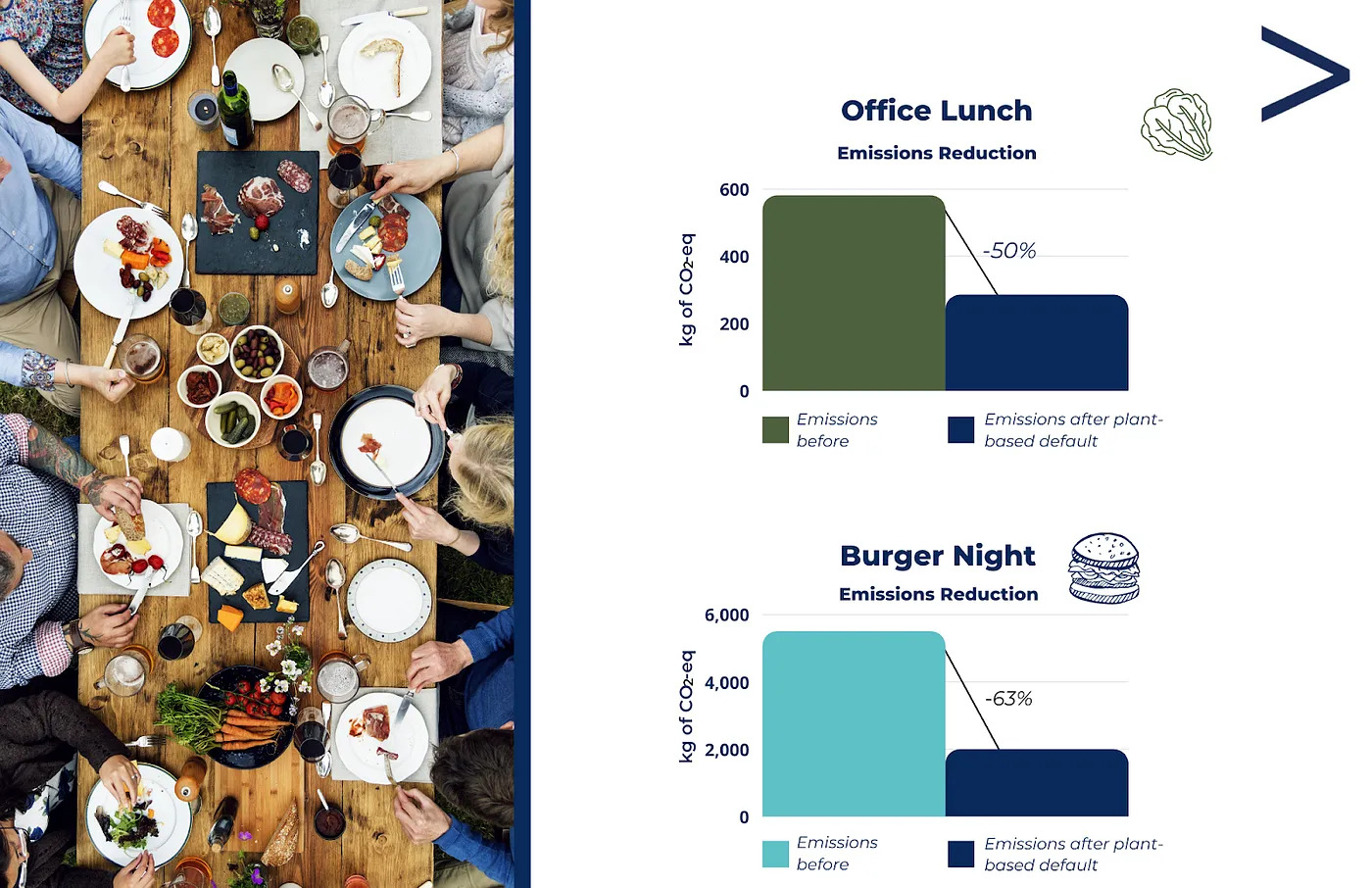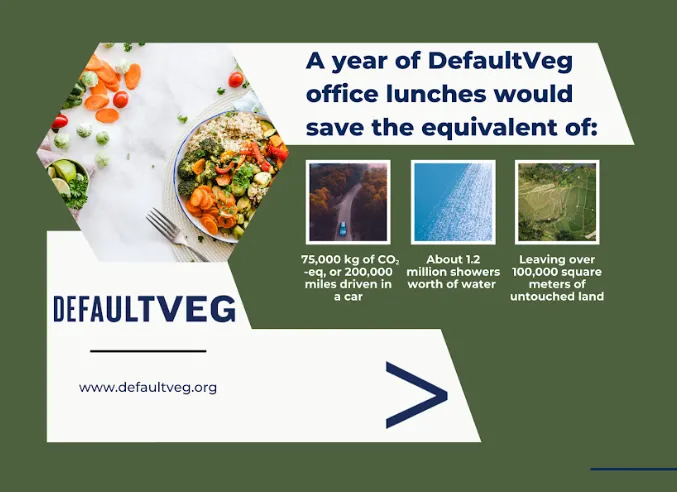This World Environment Day, we’re not just biking to work or unplugging our appliances; we’re looking back on a full year of working toward a more sustainable, resilient new normal. Over the past year, DefaultVeg has done tremendous good for people, our planet, and animals through the dozens of institutions, university departments, and conference organizers who have implemented a simple but meaningful shift in their approach to food. Together, we made menu changes that saved 41,258 kilograms of carbon dioxide, which is equivalent to a car driving 102,000 miles — enough to circle the globe four times. We also saved 46 million liters of water — 710,000 showers’ worth! In terms of land use, defaulting to plant-based foods saved 56,775 square meter-years, which means nearly 57,000 square meters of earth were left to tranquilly exist, unused, for a year. Then, of course, there are the animals: over the past year, DefaultVeg adopters saved the lives of over twenty thousand nonhuman animals.
These impact estimates were prepared this past April, but the benefits of DefaultVeg extend far beyond Earth Month, and they’ll be magnified further as more institutions get on board — and that they will. The default is changing; public interest in plant-based foods is here to stay, and leaders are noticing. Environmental stewardship is a popular motivator, but this eco-friendly, health-savvy, compassionate catering method appeals to a diverse array of organizations for different reasons, depending on their presiding values. Successful adopters range from colleges and public offices to religious organizations and public health titans.
Rachel Ram, then-senior project manager at the American Lung Association, described DefaultVeg as “a great, easy opportunity to reduce the carbon footprint of my conference.” Conference-goers at 2019’s Lung Force Expo reportedly “loved the food and didn’t even question the lack of animal products,” allaying any catering anxieties event planners might have. More recently, the healthcare sustainability conference known as CleanMed chose to make animal products opt-in at its 2022 gathering rather than opt-out. It’s only natural that health professionals dedicated to environmental protection would see the value in plant-rich foods.
The Ivies, too, have welcomed default veg meals with open arms. The University of Pennsylvania notified workshop attendees: “We take our responsibility to the environment seriously and have taken steps to reduce the carbon footprint of this event. All meals will be served DefaultVeg.” Meanwhile in Cambridge, Harvard’s Office for Sustainability took more of a multifaceted approach, referencing not just sustainability in its food policy statement but inclusivity and healthfulness. New York University echoed that and has defaulted to plant-based foods in its Office of Sustainability “to confront climate change and improve global public health,” while Northwestern’s efforts have all been student-led.
Whatever their reasons, DefaultVeg pioneers are making a tangible difference, one meal at a time. Anyone can, by choosing to eat a plant-forward diet! However, what’s particularly powerful about conferences, workshops, and other professional events is that businesses and organizations can move beyond symbolically acting on their values and make noticeable change. Large-scale events have large-scale impacts. Events with hundreds of attendees achieve hundreds of times the good. Companies can live out their mission statement in confidence, knowing that each lunch plate is conserving water, preserving land, and improving air quality. As bigger institutions join the ranks and choose to eat veg by default, the benefits to health, welfare, and planet will only grow.

Already, DefaultVeg adopters have saved carbon dioxide emissions worth the lifespan of some passenger vehicles. This is only the beginning. Our impact calculations rely on a model developed jointly by Grant Faber of the Global CO₂ Initiative and Trevor McCarty of the Better Food Foundation. Their framework estimates the real-world impacts of plant-based defaults based on 1) the number of meals served, 2) the ingredients, and 3) the proportion of plant-based to animal-based food served before/after implementation. For DefaultVeg, the model assumes an increase of about 60 percentage points in the uptake of plant-based meals, as achieved by previous case studies — which ultimately reduces food’s emissions by 40 percent and water usage by 24 percent. Using the model to project the impacts of even larger adopters quickly reveals the colossal power of defaults: a single medium corporate office would save the equivalent emissions of 200,000 miles driven and 1.2 million showers.

There’s even a customizable Excel model that interested parties can use to run their own analyses, from curious flexitarians to wedding planners to corporate decision-makers. (If you’re interested in running the numbers for your institution, please reach out to our team for statistical guidance.) It is this framework that we’ll be using in the coming months to tally the impact of 2022’s trailblazing adopters — and it’s going to be one for the books. The default is changing; good thing, too.
Latest News
See All NewsACE Review Validates Plant-Based Default Strategy
3 key insights from the recent BFF review by Animal Charity Evaluators by Executive Director, Jennifer Channin.